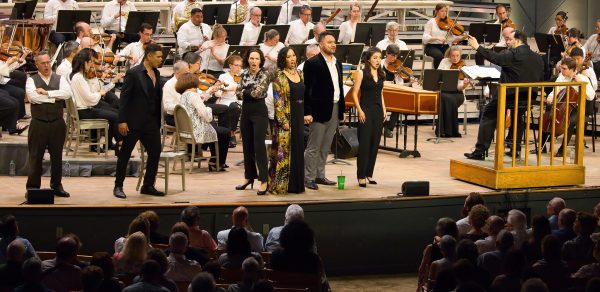 United States Tanglewood 2023 [1] – Mozart, Così fan tutte: Soloists, Tanglewood Festival Chorus, Boston Symphony Orchestra / Andris Nelsons (conductor). Tanglewood, Massachusetts, 15.7.2023. (CSa)
United States Tanglewood 2023 [1] – Mozart, Così fan tutte: Soloists, Tanglewood Festival Chorus, Boston Symphony Orchestra / Andris Nelsons (conductor). Tanglewood, Massachusetts, 15.7.2023. (CSa)

Cast:
Fiordiligi – Nicole Cabell
Dorabella – Kate Lindsey
Despina – Meigui Zhang
Ferrando – Amitai Pati
Guglielmo – Elliot Madore
Don Alfonso – Patrick Carfizzi
Tanglewood Festival Chorus (conductor: James Burton)
Director – James Darrah
Following last summer’s singularly successful, semi-staged production of Mozart’s Don Giovanni, the Boston Symphony Orchestra and a stellar cast, under its music director Andris Nelsons, embarked on a performance of Così fan tutte. Così is the last of the composer’s operas to be based on a libretto by his collaborator Lorenzo Da Ponte. It has been described as a ‘demonstration comedy’ in which human nature and human beings, purportedly in love, are examined as though under laboratory conditions, and psychological equations are proposed and proved. As Mozartian scholar and writer David Cairns memorably observed, Da Ponte’s scenario, despite all its ‘artifice and unreality, gave Mozart the ironist and compassionate anatomist of the human heart a perfect field for his gifts’. From the first declamatory bars of the overture, Andris Nelsons and his players transported us from humid Tanglewood, a musical Arcadia set deep in the lush, verdant Berkshire mountains of Western Massachusetts, to the sweet breezes and placid waters of the Bay of Naples. Here, in this other Arcadia, Da Ponte’s characters, animated by Mozart’s sublime music, devote themselves entirely to the business of love.
The plot is deceptively simple. Two young officers, Ferrando and Guglielmo, are engaged to be married to sisters Fiordiligi and Dorabella. Confident of the faithfulness of their fiancées, the men are persuaded by a cynical old friend, Don Alfonso, to place a bet on their constancy. A not-so-cunning plan is hatched, with the help of the ladies’ maid Despina, whereby the soldiers pretend to go off to war and return, disguised as Albanians (achieved here with Dalì-like handlebar moustaches), to woo the other’s sister. If the sisters surrender to their charms, the bet is lost. The story of the opera could easily be dismissed as frivolous, and the message misogynistic. After all, the title loosely translated is ‘all women are like that’. In fact, Da Ponte’s libretto, to which Mozart responds so brilliantly, is a deeply perceptive insight into human frailty – both male and female – where grotesque comedy and poignant tragedy coexist.

Assembling an outstanding cast of soloists is an important ingredient for the success of any opera. Making a welcome return to Tanglewood this season in the role of Fiordiligi was the acclaimed lyric soprano Nicole Cabell, winner of the 2006 BBC Singer of the World Competition and last year’s Donna Elvira. She possesses a lovely voice of astonishing agility and triumphed over the wide intervals and precipitous leaps from the top and bottom of the opera’s taxing soprano range. Her rendition of the great second act aria ‘Per pietà, ben mio, perdona’ (‘Ah my love, forgive my madness’), gently serenaded by a haunting horn obbligato, was in turn fiercely declamatory and meltingly tender. It served as a showstopping example of her virtuosity. Meanwhile, as Dorabella, soprano Kate Lindsey’s darker hued and velvet mezzo-soprano provided the perfect foil. Her protestations of unbearable grief when her fiancé leaves for war were almost credible in the mock heroic ‘Smanie implacabili’, an aria in which she reveals her inner turmoil. The inconstant sisters, whose fidelity is severely tested by their masquerading lovers, were well matched. Canadian Elliot Madore, whose richly resonant baritone conjured up a jocund and almost amiable Guglielmo, while Samoan lyric tenor Amitai Pati – who last year made such an impact at Tanglewood as Don Ottavio – played Ferrando, Fiordiligi’s teasing other half. Pati is a gifted and lyrical Mozartian with a silvery upper register of ineffable beauty. He delivered solo arias, such as ‘Un’aura amorosa’ (‘A breath of love’) with great delicacy. Of the two remaining soloists, bright-voiced soprano Meigui Zhang sparkled as the scheming Despina, while Patrick Carfizzi’s vibrant bass-baritone and comic talent made for a compelling Don Alfonso.
Strong individually, the six were at their best when singing together in various combinations in the many glorious ensembles, the textures of their voices blending perfectly. Conveying the comedic element in Così on a physical level proved more difficult. Under James Darrah’s direction the work’s farcical humour was a bit over the top – unnecessarily stretched by some clumsy capering and exaggerated facial expressions. This is, however, a small reservation, given the overwhelming quality of the music-making. Credit for this must be shared by the skilled players of the BSO, their number reduced in size to ensure period authenticity, and a first-rate chorus under the steady baton of Andris Nelsons. His undemonstrative but unwavering attention to detail wove together all the musical strands and subtleties of this complex work, and the overall result was magnificent.
Chris Sallon
